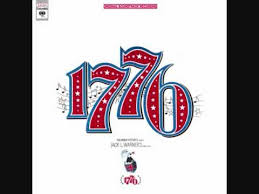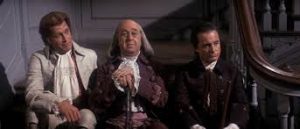SHORT TAKE:
1776 is the singularly most creative cinematic movie about the American Revolution ever filmed. A musical which covers the entire spectrum of emotions, it is a unique classic and should be watched every July 4th.
WHO SHOULD WATCH:
Everyone! — with provisos. There is a bit of language, often uttered by an angry and frustrated John Adams, and a few mild and oblique references to marital intimacy.
AND IF YOU LIKE THESE REVIEWS PLEASE SUBSCRIBE! THEN YOU'LL GET EVERY NEW REVIEW SENT STRAIGHT TO YOUR E-MAIL!!
GO TO THE BOTTOM OF THE LEFT HAND SIDE AND TYPE YOUR E-MAIL IN – IT (SHOULD BE) THAT EASY. ANY PROBLEMS PLEASE SEND ME A COMMENT AND I'LL DO MY BEST TO RESOLVE YOUR ISSUE.
LONG TAKE:
In 1972 a most unlikely musical was released about an event which had happened almost exactly 200 years before. Based on the Broadway musical of the same name, the movie 1776, featuring most of the Broadway cast, is about the signing of the Declaration of Independence.
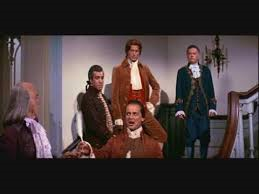 Unique in the genuine sense of the word, in that there is not another movie like it, the movie stars several actors, like Howard De Silva, who were perfect in their role but known for little else. Directed by Peter Hunt, written by Peter Stone (author of two Cary Grant vehicles – Father Goose and Charade), with music and lyrics by pop song writer, Sherman Edwards, 1776 looks in a very affectionate, humanizing way, at the Founders of what would become The United States of America. Much of the dialogue and lyrics were written by the historical figures themselves and reproduced from letters and speeches that they gave. It was released by Jack Warner as a love letter to America in gratitude to his adopted country.
Unique in the genuine sense of the word, in that there is not another movie like it, the movie stars several actors, like Howard De Silva, who were perfect in their role but known for little else. Directed by Peter Hunt, written by Peter Stone (author of two Cary Grant vehicles – Father Goose and Charade), with music and lyrics by pop song writer, Sherman Edwards, 1776 looks in a very affectionate, humanizing way, at the Founders of what would become The United States of America. Much of the dialogue and lyrics were written by the historical figures themselves and reproduced from letters and speeches that they gave. It was released by Jack Warner as a love letter to America in gratitude to his adopted country.
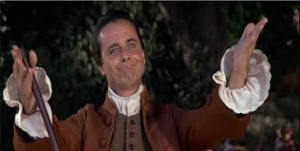 The story begins humorously with an extremely frustrated John Adams (William Daniels, who spoke one of the most famous words ever uttered in film history as Benjamin Braddock's father in The Graduate – "Plastics") ranting and singing to God about the indecisiveness of Congress on the issue of Independence: "I have come to the conclusion that one useless man is called a disgrace; that two are called a law firm, and that three or more become a Congress!"
The story begins humorously with an extremely frustrated John Adams (William Daniels, who spoke one of the most famous words ever uttered in film history as Benjamin Braddock's father in The Graduate – "Plastics") ranting and singing to God about the indecisiveness of Congress on the issue of Independence: "I have come to the conclusion that one useless man is called a disgrace; that two are called a law firm, and that three or more become a Congress!"
The movie takes us through the steps taken to begin this massive process never before attempted – of a colony breaking with its mother country – and concludes with the portrayal of the signing of the Declaration of Independence. Although the writer stuck to as much accurate history as possible, the signing of the body of Congress on July 4th was one of the few examples of historic liberty they took for dramatic purposes. In fact, only John Hancock signed the document on July 4th, with the rest of Congress signing by August.
Most musicals, like Tinkerbell was described by the famous James Barrie in Peter Pan, can usually handle only one prominent emotion at a time: humor, heartbreak, love, anger, etc.
1776 has masterful command of the gamut of every emotion: comedy, drama, romance, inspirational, and heartbreaking.
 The movie leads with comedy as John and the rest of the Congress sing a song whose the refrain repeats that John is "obnoxious and disliked".
The movie leads with comedy as John and the rest of the Congress sing a song whose the refrain repeats that John is "obnoxious and disliked". 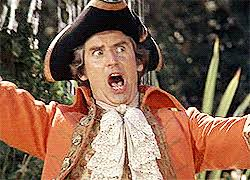 Humor is again found in the effusive enthusiasm of Richard Henry Lee as he rides off to get the signatures of his political colleagues in Virginia.
Humor is again found in the effusive enthusiasm of Richard Henry Lee as he rides off to get the signatures of his political colleagues in Virginia. 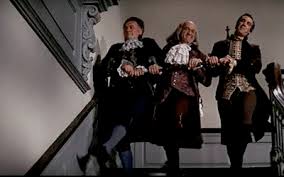 And again there's a lighthearted look at the decision of who will be assigned to write the Declaration.
And again there's a lighthearted look at the decision of who will be assigned to write the Declaration.
 Heartbreak is profound in the song sung by an exhausted Courier, who reminisces about his dying friend lying on the battlefield near his home, crying out, hoping his mother would find him before he died.
Heartbreak is profound in the song sung by an exhausted Courier, who reminisces about his dying friend lying on the battlefield near his home, crying out, hoping his mother would find him before he died.
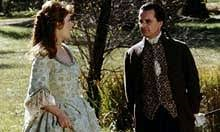 There's tender humor in the romantic songs between John and John's wife Abigail (Virginia Vestoff). The actors sing lyrics captured straight from correspondence between these two historically important characters. The actors walk side by side, tease and familiarly exchange household gossip, and palpably yearn for each other but never touch as, separated by hundreds of miles, their communications are, in truth, only through the written word.
There's tender humor in the romantic songs between John and John's wife Abigail (Virginia Vestoff). The actors sing lyrics captured straight from correspondence between these two historically important characters. The actors walk side by side, tease and familiarly exchange household gossip, and palpably yearn for each other but never touch as, separated by hundreds of miles, their communications are, in truth, only through the written word. 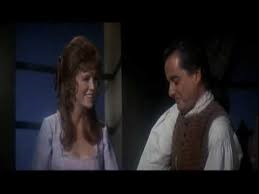 John's obvious devotion to his wife is one of the features that makes John an extremely likable character despite his egotism and tendency to be overbearing. The refrain of the songs "Til then" really appears in the affectionate signatures on the letters of John and Abigail to each other. More romantic comedy emerges as the love lorn Thomas is
John's obvious devotion to his wife is one of the features that makes John an extremely likable character despite his egotism and tendency to be overbearing. The refrain of the songs "Til then" really appears in the affectionate signatures on the letters of John and Abigail to each other. More romantic comedy emerges as the love lorn Thomas is 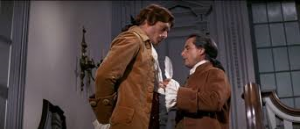 bullied into staying to write the Declaration instead of visiting his new wife by the physically smaller but indomitable John.
bullied into staying to write the Declaration instead of visiting his new wife by the physically smaller but indomitable John. 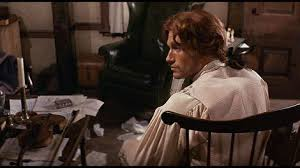
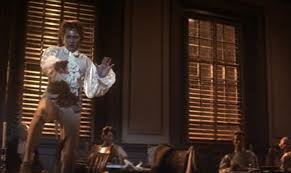 Breathtaking drama arises when Edward Rutledge (John Cullum, a recognizable TV character actor most notably from Northern Exposure) confronts John Adams on behalf of the southern colonies over the provision in the Declaration which would have abolished slavery. The South wanted to keep slaves and
Breathtaking drama arises when Edward Rutledge (John Cullum, a recognizable TV character actor most notably from Northern Exposure) confronts John Adams on behalf of the southern colonies over the provision in the Declaration which would have abolished slavery. The South wanted to keep slaves and  John Adams understood what a terrible evil it was. Rutledge points out in "Molasses to Rum", which has the entire Congress hanging their heads in shame, the hypocrisy of the North, which participated in the Molasses to Rum to Slaves trade.
John Adams understood what a terrible evil it was. Rutledge points out in "Molasses to Rum", which has the entire Congress hanging their heads in shame, the hypocrisy of the North, which participated in the Molasses to Rum to Slaves trade.
Inspiration is found, 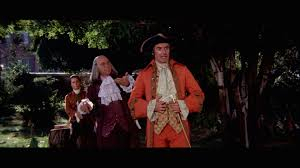 not only throughout the entire movie and its underlying premise, but especially in the song "Is Anybody There?"
not only throughout the entire movie and its underlying premise, but especially in the song "Is Anybody There?" 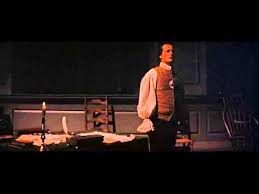 Adams sings to an empty Congressional Hall, while anxiously awaiting the return of a divided Congress, about his vision of a United America and all of its prosperous and powerful possibilities and opportunities for its citizens. The lyrics were taken from a letter he wrote to Abigail just after the signing.
Adams sings to an empty Congressional Hall, while anxiously awaiting the return of a divided Congress, about his vision of a United America and all of its prosperous and powerful possibilities and opportunities for its citizens. The lyrics were taken from a letter he wrote to Abigail just after the signing.
Brilliantly and most moving are the final moments of the movie. It is no spoiler to reveal that the document was indeed signed. The director, Peter Hunt, carefully assembled the actors into a representation of the famous painting by John Trumbull called The Declaration of Independence. 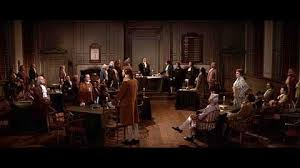
 While the perspective of the final scene in the movie, in relation to the signing table, is opposite that in the painting, the positions of the men around that table are the same. In order to get the panoramic shot, Hunt had to tear down the wall behind the camera so it could move back far enough.
While the perspective of the final scene in the movie, in relation to the signing table, is opposite that in the painting, the positions of the men around that table are the same. In order to get the panoramic shot, Hunt had to tear down the wall behind the camera so it could move back far enough.
Small details were employed which indicated the care with which the performers were anxious to make accurate every detail they could. For example, they frequently sang or spoke about how hot it was in July in Philadelphia, however they were really filming in winter and it was cold. 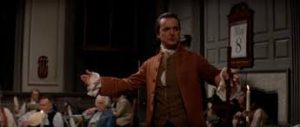 So, William Daniels, while singing outside, sucked on an ice cube so that his breath would not fog.
So, William Daniels, while singing outside, sucked on an ice cube so that his breath would not fog.
There were a number of beautifully poetic aspects to the movie 1776. For many of the performers, this fim was the highlight of their careers. They were cast straight from the Broadway production in contravention to the usual procedure of hiring an entirely new cast when making transition from live to film. Rumor has it that this decision was made because Hunt thought Cukor erred in not casting Broadway's Julie Andrews as Eliza Doolittle when My Fair Lady was filmed. Vestoff, who played Abigail, 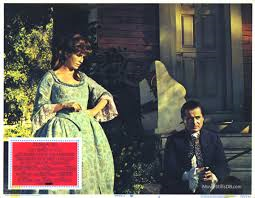 tragically passed away from cancer only a few years after the release of 1776.
tragically passed away from cancer only a few years after the release of 1776. 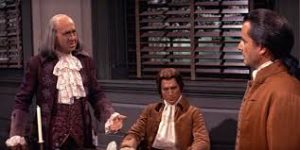 Howard De Silva, blacklisted after refusing to denounce any Communist ties, ironically played the VERY patriotic Benjamin Franklin after the ban on him was lifted. During the course of his career, William Daniels has played John Adams, Adam's son John Quincy Adams, and John's cousin Samuel Adams. References to some of the lines in the play, either spoken by or about John Adams, have cropped up over the years in productions Daniels was in, such as references to being "obnoxious and disliked" during his stint in the TV show St. Elsewhere.
Howard De Silva, blacklisted after refusing to denounce any Communist ties, ironically played the VERY patriotic Benjamin Franklin after the ban on him was lifted. During the course of his career, William Daniels has played John Adams, Adam's son John Quincy Adams, and John's cousin Samuel Adams. References to some of the lines in the play, either spoken by or about John Adams, have cropped up over the years in productions Daniels was in, such as references to being "obnoxious and disliked" during his stint in the TV show St. Elsewhere. 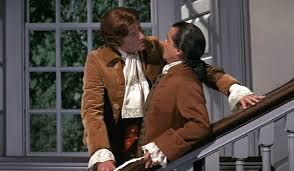 Ken Howard, who plays Thomas Jefferson, and William Daniels both embodied characters who later became president of the United States, Adams for one term and Jefferson for two. Coincidentally, both Daniels and Howard served as president of the Screen Actors Guild, Daniels for one term and Howard for two.
Ken Howard, who plays Thomas Jefferson, and William Daniels both embodied characters who later became president of the United States, Adams for one term and Jefferson for two. Coincidentally, both Daniels and Howard served as president of the Screen Actors Guild, Daniels for one term and Howard for two.
Sadly, 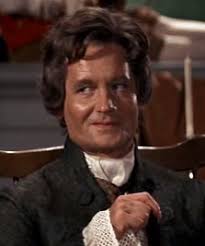
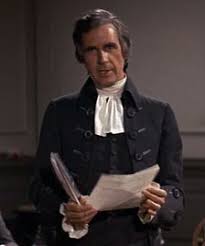
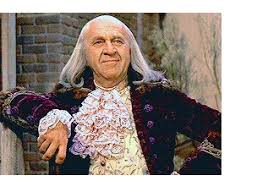
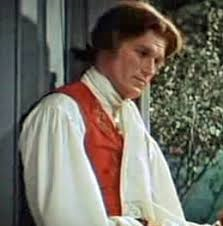
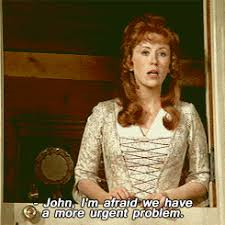 many of the performers in the movie have since passed away, but their performances in this unique, stunningly brilliant, movingly entertaining, and insightfully historic movie will last as long as we have access to the film and are inspired to watch it.
many of the performers in the movie have since passed away, but their performances in this unique, stunningly brilliant, movingly entertaining, and insightfully historic movie will last as long as we have access to the film and are inspired to watch it.
There are some language issues and there are some allusions to sexual activity by Franklin as a local playboy, and between 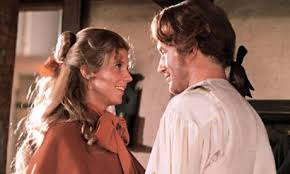 Thomas Jefferson and his wife, though absolutely nothing is ever scene and all comments are gently played for comic effect. One example is the allusion sung by
Thomas Jefferson and his wife, though absolutely nothing is ever scene and all comments are gently played for comic effect. One example is the allusion sung by 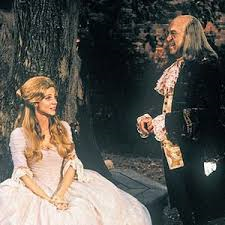 Martha Jefferson (Blythe Danner), "He Plays The Violin"
Martha Jefferson (Blythe Danner), "He Plays The Violin" 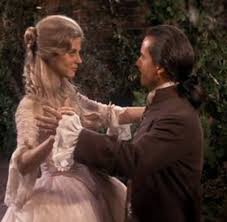 with reference to Jefferson's wooing her: "…Twixt my heart, Tom, and his fiddle, my strings are unstrung."
with reference to Jefferson's wooing her: "…Twixt my heart, Tom, and his fiddle, my strings are unstrung."
 Aside from those minor concerns, I cannot recommend this movie highly enough.
Aside from those minor concerns, I cannot recommend this movie highly enough. 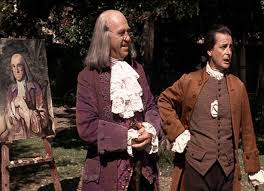 Plan to laugh, bring Kleenex, and know you will want to stand and cheer. Watch 1776 ANY time but especially to celebrate the 4th of July.
Plan to laugh, bring Kleenex, and know you will want to stand and cheer. Watch 1776 ANY time but especially to celebrate the 4th of July.
